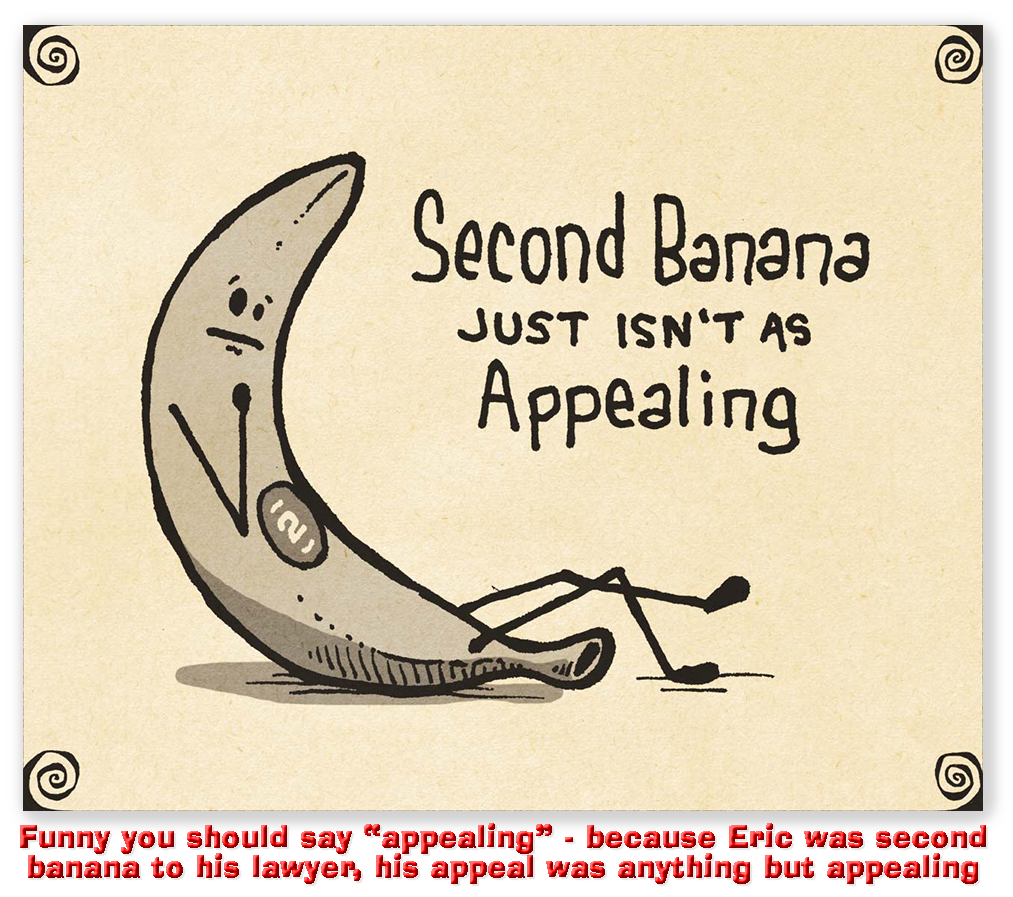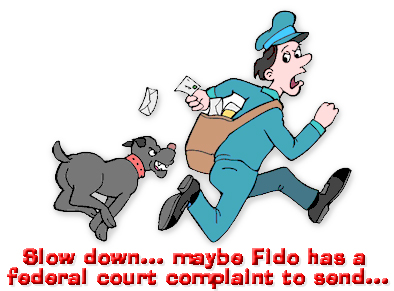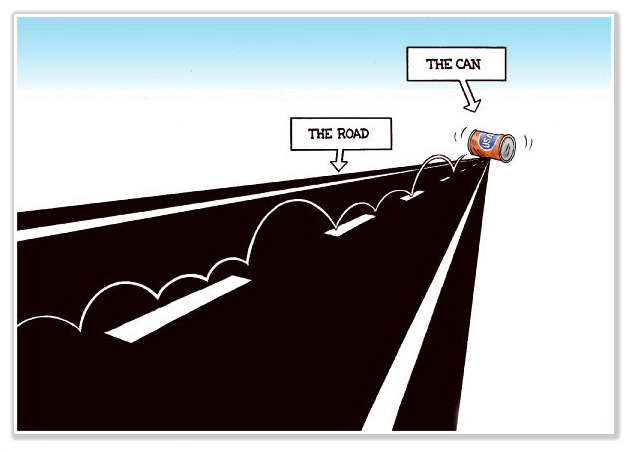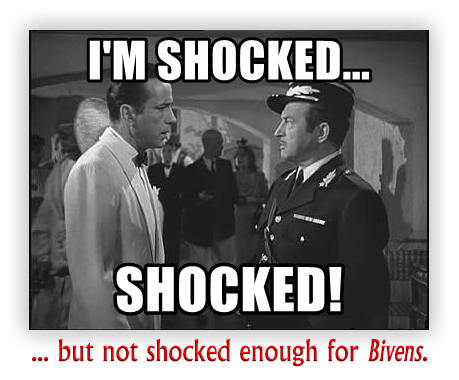We post news and comment on federal criminal justice issues, focused primarily on trial and post-conviction matters, legislative initiatives, and sentencing issues.

LAWYERS BEHAVING BADLY
Today, we feature a pair of cases in which lawyers are the stars, and not in a good way:
 I Feel Conflicted: When Eric Scurry arrived for day 1 of his drug trial, his lawyer – Chris Davis – was missing. It seemed Chris had a hearing in another courtroom, and that one was more important to him than Eric’s was. This is not a development calculated to give a client a warm, fuzzy feeling about his attorney, the notion that his or her freedom was playing second banana to a client who had paid more for the lawyer’s services.
I Feel Conflicted: When Eric Scurry arrived for day 1 of his drug trial, his lawyer – Chris Davis – was missing. It seemed Chris had a hearing in another courtroom, and that one was more important to him than Eric’s was. This is not a development calculated to give a client a warm, fuzzy feeling about his attorney, the notion that his or her freedom was playing second banana to a client who had paid more for the lawyer’s services.
But not to fear, Eric! Chris’s wife, Mary, was also a lawyer, and Chris – who cared about Eric’s case very much – dispatched her to cover the trial. No matter (as it turned out later) that Mary had not read the file and knew nothing about Eric’s case. She was a warm body with a law degree, just what a guy facing decades in prison needed.
Had Mary read the file, she would have been aware that Eric and his co-defendants previously had attacked the wiretap that led to their arrest for a technical deficiency, albeit a glaring one. The district court denied their motion to suppress the evidence, but the issue their joint motion raised was a substantial one.
Everyone on the defense side of the table knew that… except for Mary. She convinced Eric to take a plea deal for a minimum 10 years, reserving only the right to appeal one inconsequential pretrial holding. The co-defendants also pled, but their attorneys reserved the right to appeal the wiretap suppression.
 That turned out to be a good deal for Eric’s co-defendants. They appealed and won. The Court of Appeals held the government’s wiretap application to be deficient, and all of the evidence against them was suppressed. The co-defendants walked free. But Eric did not, because his plea deal did not reserve the right to raise that issue.
That turned out to be a good deal for Eric’s co-defendants. They appealed and won. The Court of Appeals held the government’s wiretap application to be deficient, and all of the evidence against them was suppressed. The co-defendants walked free. But Eric did not, because his plea deal did not reserve the right to raise that issue.
Eric seemed to recognize that Mary had screwed up, because on appeal, he had the Davises thrown off his case. He told the court he planned to accuse them later of incompetence. That made sense. But what happened next did not.
Inexplicably, when Eric filed a post-conviction motion under 28 USC § 2255 seeking to set aside his guilty plea, Mary offered to represent him on the motion, and he agreed. She then amended the § 2255 motion, claiming Eric had been coerced into pleading guilty by the evidence that had later been thrown out in his co-defendants’ cases, thus giving him the same level of professional representation on his § 2255 that she had given him at trial: lousy.
The problem was simple: to set aside his guilty plea and plea deal, Eric was required to show not just that his perception of the admissibility of the evidence was wrong, but that his lawyer had given him incompetent representation. Which of course Mary had. But because Mary failed to argue her own incompetence during the § 2255, the court denied Eric relief.
 Last week, the D.C. Circuit threw Mary (and, for good measure, Chris) off the case again. The problem is, the Circuit said, “as long as counsel’s advice to take the plea rather than gamble on an evidentiary suppression issue was “reasonably competent,” the plea is “not open to attack on the ground that counsel may have misjudged the admissibility of the defendant’s confession.” That being the case, Eric could not win his § 2255 unless he showed Mary has given him incompetent advice. And that, as I noted, meant Mary would have to argue that she was incompetent.
Last week, the D.C. Circuit threw Mary (and, for good measure, Chris) off the case again. The problem is, the Circuit said, “as long as counsel’s advice to take the plea rather than gamble on an evidentiary suppression issue was “reasonably competent,” the plea is “not open to attack on the ground that counsel may have misjudged the admissibility of the defendant’s confession.” That being the case, Eric could not win his § 2255 unless he showed Mary has given him incompetent advice. And that, as I noted, meant Mary would have to argue that she was incompetent.
The Circuit ruled that “by affirmatively intervening in Scurry’s collateral proceedings despite the conflict and not pressing the ineffective assistance claim, Davis seemingly made a choice advancing her own interest at the expense of her client’s.”
Eric will get another shot at relief, this time – we trust – with a competent lawyer.
 I’m A U.S. Male: Elvis warned that you shouldn’t “tamper with the property of the U.S. Mail (or maybe ‘male’)”. Last week, Sixth Circuit said you can’t use the U.S. mail to tamper with statutory deadlines, either.
I’m A U.S. Male: Elvis warned that you shouldn’t “tamper with the property of the U.S. Mail (or maybe ‘male’)”. Last week, Sixth Circuit said you can’t use the U.S. mail to tamper with statutory deadlines, either.
Blake Cretacci hired a lawyer to file a 42 USC § 1983 action for damages against some local jail guards who allegedly used excessive force against him and . Blake hired a local lawyer by the unlikely name of Andy Justice, who prepared the complaint. Andy planned to file the federal court complaint electronically, as attorney members of the bar of the court are allowed to do. But on the night before the statute of limitations expired on Blake’s claim, Andy discovered that Coffee County, Tennessee, where the conduct occurred, was not in the Middle District of Tennessee, where Andy was admitted, but instead in the Eastern District of Tennessee, where Andy was not admitted.
The next day, Andy tried to get admitted to the Eastern District so he could electronically file the complaint, but that could not be accomplished in only a day. Andy drove to a federal courthouse in Winchester, Tennessee, to try to file the complaint in person, but there was no staffed clerk’s office there. By then, Andy could not get to the Chattanooga federal courthouse in time, but he had an idea.
The “prison mailbox rule,” enshrined in Houston v. Lack, holds that if an inmate files a document with a federal court by mailing it from the prison, the filing is deemed to be delivered to the courthouse the moment the inmate turns it over to a prison official. Andy, being a bright lawyer, knew this, so he ran the complaint over to Blake at the jail.
Andy told Blake that he should deliver it to a correctional officer immediately, explaining that because he was an inmate, he could take advantage of the prison mailbox rule. Blake did so.
 Last week, the 6th Circuit threw out Blake’s complaint as untimely. The Circuit ruled that “the prison mailbox rule was created to prevent pro se prisoners from being penalized by any delays in filing caused by the prison mail system. But if a prisoner does not need to use the prison mail system, and instead relies on counsel to file a pleading on his or her behalf, the prison is no longer responsible for any delays and the rationale of the prison mailbox rule does not apply… Accordingly, we hold that, in the context of the filing of civil complaints, the prison mailbox rule applies only to prisoners who are not represented by counsel and are proceeding pro se.”
Last week, the 6th Circuit threw out Blake’s complaint as untimely. The Circuit ruled that “the prison mailbox rule was created to prevent pro se prisoners from being penalized by any delays in filing caused by the prison mail system. But if a prisoner does not need to use the prison mail system, and instead relies on counsel to file a pleading on his or her behalf, the prison is no longer responsible for any delays and the rationale of the prison mailbox rule does not apply… Accordingly, we hold that, in the context of the filing of civil complaints, the prison mailbox rule applies only to prisoners who are not represented by counsel and are proceeding pro se.”
Nice try, Andy, but you can’t use the U.S. mail to tamper with court deadlines. Elvis could have told you that.
United States v. Scurry, Case No 18-3067, 2021 U.S.App. LEXIS 4785 (D.C. Cir. Feb 19, 2021)
Cretacci v. Call, Case No 20-5669, 2021 U.S.App. LEXIS 4493 (6th Cir. Feb 17, 2021)
– Thomas L. Root


 When Larry later sued under 42 U.S.C. § 1983, alleging that the police violated his 4th Amendment right to be free of unreasonable search or seizure), his case was thrown out. Existing New York law held the plaintiff had to show the underlying criminal case had been initiated without probable cause, initiated for a purpose other than bringing the defendant to justice, and terminated in favor of the defendant. A “favorable termination” was one where the plaintiff had been found to be not guilty.
When Larry later sued under 42 U.S.C. § 1983, alleging that the police violated his 4th Amendment right to be free of unreasonable search or seizure), his case was thrown out. Existing New York law held the plaintiff had to show the underlying criminal case had been initiated without probable cause, initiated for a purpose other than bringing the defendant to justice, and terminated in favor of the defendant. A “favorable termination” was one where the plaintiff had been found to be not guilty. Last week, the Supreme Court greatly expanded a former defendant’s ability to bring a 42 U.S.C. § 1983 claim, holding that “terminated in favor” means only that the “prosecution ended without a conviction” and not “with some affirmative indication of innocence.”
Last week, the Supreme Court greatly expanded a former defendant’s ability to bring a 42 U.S.C. § 1983 claim, holding that “terminated in favor” means only that the “prosecution ended without a conviction” and not “with some affirmative indication of innocence.”














